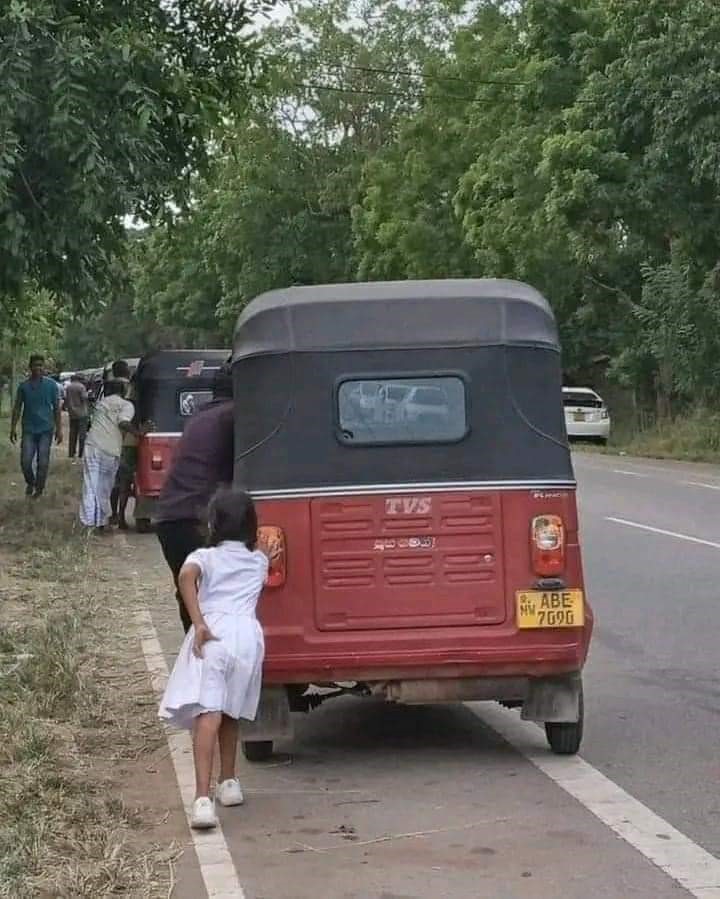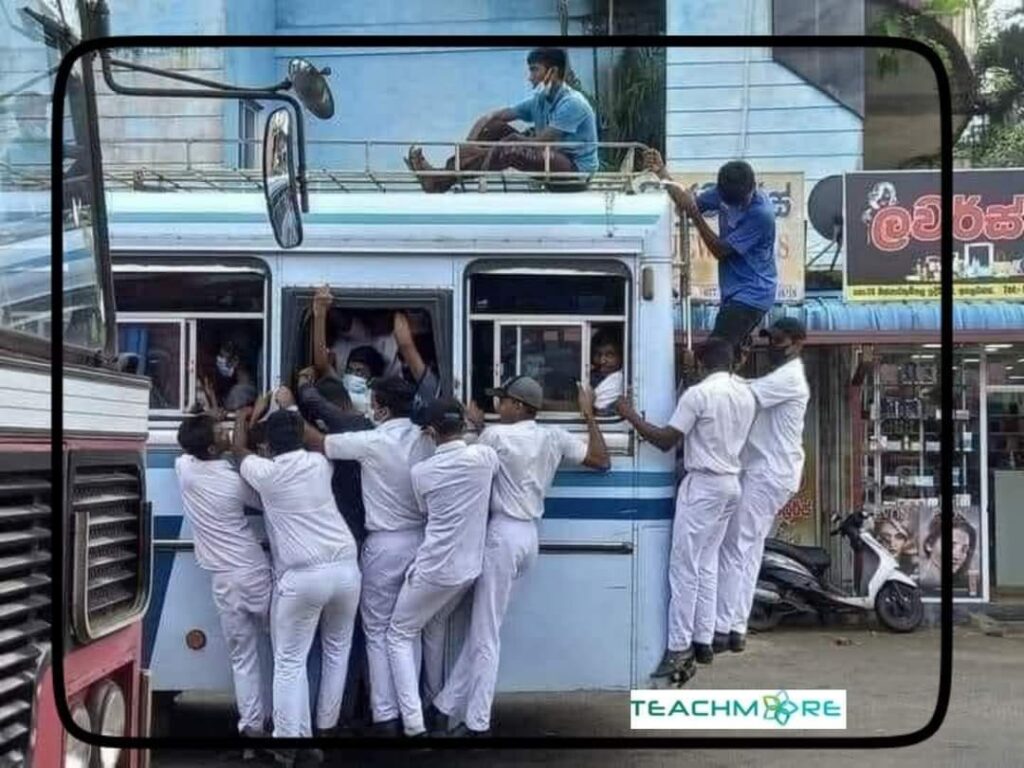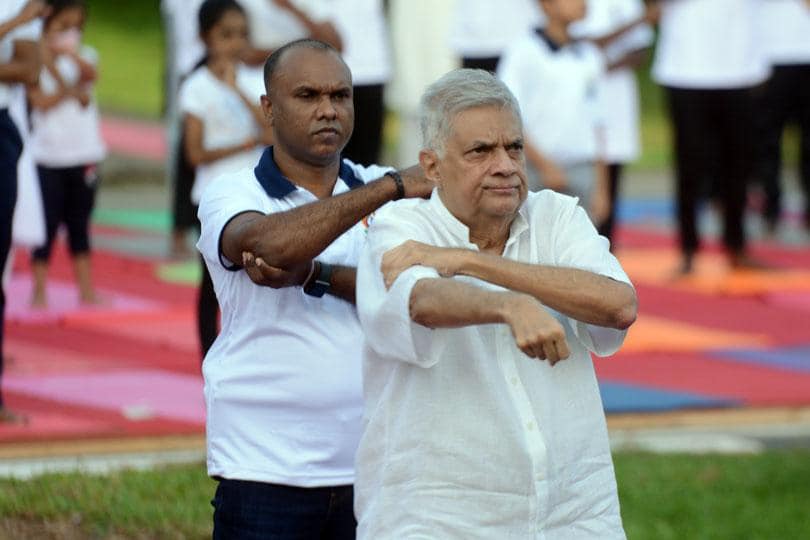by Nillanthan Maha in his blog, July 2, 2022
[translated from the original Tamil with Google Translate plus edits]
Gotabaya did not go home. But a situation is developing where the people who fought to ask him to go home are paralyzed inside their homes. The country is moving towards a state of near social paralysis due to the fuel crisis. Private vehicles are hardly seen on the roads. Public transport is limited.

Bicycles are back on the streets of Jaffna. Most of the government officials, presidents and students have returned to bicycles. The prices of bicycles are increasing like never before. The price of a bicycle has crossed 50 thousand. Traders are selling at low prices saying that this is the opportunity. Bicycle repairers, tired of the past years, are enthusiastically keeping their shops open. There is a kind of happiness when you see bicycles on the streets with less traffic. It is a good within a bad. This is the situation in the last few years. After the arrival of Covid-19, exercise has increasingly become a culture among the Tamil people. Before the virus, it was revealed that the turmeric that was bought in dental stores under the name of Manjadhoo was not pure turmeric, and it was only when I bought crushed turmeric and made it into a paste that I read all the books that I had left unread. Families cook and eat together.
Now as a result of the fuel crisis, the bicycle has become a necessity again. There is pain in that change, but it is a healthy change. The bicycle does not run with the speed of the information age. But it can help regain the health lost by humans caught up in the speed of the information age. In the 1980s, girls went to school on bicycles in Tamil areas. They are still going, but there is a difference. Now the student’s father or mother has to go on another cycle. That is the worst. Gone are the days when girls used to study alone or with each other.
People no longer stand in queues for cooking gas. Instead of waiting for it, they have started looking for alternatives. Similarly, they are getting bored of waiting for fuel. Last week, instead of fuel queues, there were more queues to get tokens. Why should they stand in queues to buy tokens for non-arriving fuel?

At a time when smart people have decided that it is better to cycle than stand in humiliating, boring queues for fuel, three important delegations visited the island of Sri Lanka last week. The first, a delegation from the International Monetary Fund. The second is a delegation headed by the Indian Foreign Secretary. Third, a delegation from the US State and Treasury Departments. All three delegations had almost the same objective. That diplomatic intent is how to further tighten their grip on the island by saving Sri Lanka from its economic woes. China has stood by and watched like a witness for the past few months. China has established a stronger foothold than ever before in the history of this small island. Neither India nor America can remove China so easily. Removing China from Ambantotai means waiting for almost 90 years. Private commercial activities alone are not enough to dislodge China from the port city. So China cannot be eliminated for now. But along with China, other superpowers can share this small island, like sharing the meat of the goat sacrificed in Velvi.
So where is the country that the Rajapaksas won and gave to the Sinhalese in 2009? Who did they defeat in 2009? Have they defeated themselves? Where is the sovereignty they proudly proclaimed? How can a small island divided by empires call itself a virtuous and independent nation?
During World War II, the British people chose Winston Churchill as their leader. He won the war, but the British rejected him in subsequent elections. It was clear to the British that it was one thing to conduct a war and another to govern the country in a time without war. The Sinhalese did not have that clarity. They gave election victories to the Rajapaksa family for the merit of winning the war. They watched silently when a family stole this country because of the merit of winning the war. But the Delta strain proved in a gruesome way that war and virus are not the same thing. Similarly, the last year proved that war and economic crisis are not the same thing.
When the Sinhalese people found out that the merit of winning the war is not enough to rule the country, the country stood in line for fuel and cooking gas. Wisdom was born to the Sinhalese people in the dark nights without electricity. The wisdom born to the British people after the end of the war was born to the Sinhalese people only after 13 years. When the Sinhalese people realized that they could not eat the victory of the war, they were left with only a few potsherds and dark nights without electricity. They started fighting against the heroes of the war.
But this does not mean that war triumphalism has grown old and its luster has faded. War triumphalism is an updated version of post-2009 Sinhala Buddhist nationalism. Sinhalese have now thrown the war heroes into the dustbin, not the war victory. The great weakness of electoral democracy is the forgetfulness of the people. The Filipinos ousted dictator Marcos 36 years ago, but elected his wife Imelda 10 years later. Now after 36 years they have chosen his son. People forget too much. Namal Rajapaksa knows that. He is the heir of military victory. Namal Rajapaksa will wait with hope until he is old enough to win the war.

Fearing the wrath of the Sinhalese people, most of the Rajapaksas resigned from their posts. But the one who the Sinhalese asked to go first is still clinging to the rope. That means the struggle has not yet achieved its complete victory. To prevent that victory, the Rajapaksas have successfully put forward a countermeasure called Ranil. Western countries will also welcome the change to Ranil’s leadership, because it is convenient for the West if they can change the regime without an election. If we leave Ranil, the world has no other choice. If we leave Ranil, the Rajapaksas also have no other choice. Parliament also has no other choice.
As Cardinal Malcolm Ranjit says, a leader who can win the trust of the entire country is not visible in the political arena now. That is why they have brought Dhammika Perera to replace Basil. Dhammika is known as Rajapaksa’s surrogate. He also talks like Gnanakka. “My period is 6 months, which means I have only 960 hours to work. If I don’t do something progressive within that period, the children will come to my house saying ‘grandfather come home’. They will come. Then I have to go home. If someone like me can’t do something positive for the people within 6 months, then what is the use of holding the office?” Dhammika said. Not a scientific approach to politics. This means that there are no leaders in the ruling party and there are no leaders in the opposition. Sri Lanka has become a failed country, Maha Nayaks say. It is not only the failure of the politicians. He was defeated by the Maha Sangham.
Those who won the war have lost. The country won in the war does not belong to those people. Society is paralyzed even without the virus. There is curfew on the streets without war. Bicycles run slowly on the streets without cars. Is Sri Lanka now the wonder of Asia? Or the scum of Asia?
It is a principle of sociology that when an ethic group is under threat from another that ethnic group come together to put down the OTHER. When the threat is eliminated the victor group disintegrate by fighting from within.
I hope the ethnic or linguistic community larger in numbers invite the communities smaller in numbers to resolve the differences and get together to eliminate poverty and establish food security. The first action by GOSL to send the army to the barracks.